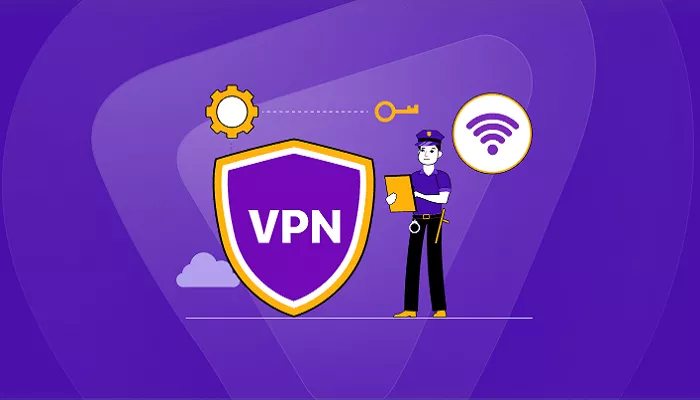In today’s digital age, many individuals use Virtual Private Networks (VPNs) to enhance their online privacy and security. VPNs encrypt internet traffic and mask users’ IP addresses, making their online activities more private. However, a common question arises: Can law enforcement agencies, such as the police, track individuals who use VPNs? This article explores this topic, providing a detailed yet straightforward explanation.
Understanding How VPNs Work
A VPN creates a secure, encrypted tunnel between your device and a remote server operated by the VPN provider. This process hides your real IP address and assigns you one from the VPN server, making it appear as though your internet traffic originates from a different location. This mechanism offers several benefits:
- Privacy Protection: Conceals your browsing activities from your Internet Service Provider (ISP) and potential eavesdroppers.
- Security Enhancement: Encrypts data, safeguarding it from hackers, especially on public Wi-Fi networks.
- Access to Restricted Content: Allows users to bypass geo-restrictions and access content available in other regions.
Can Police Track VPN Users?
The ability of law enforcement agencies to track VPN users depends on various factors, including the VPN provider’s policies, the legal framework of the jurisdiction, and the methods employed by the authorities.
1. VPN Logs and User Activity
Some VPN providers maintain logs of user activities, such as connection times, IP addresses, and data usage. If these logs are stored, they can potentially be accessed by law enforcement agencies through legal means, such as court orders. For instance, certain VPN providers have complied with authorities in the past, providing logs that led to the identification of users involved in illegal activities.
2. No-Logs Policies
Many reputable VPN providers adopt strict no-logs policies, meaning they do not store any information about users’ online activities. In such cases, even if law enforcement agencies request data, the VPN provider would have no information to share. However, the effectiveness of a no-logs policy depends on the provider’s honesty and the legal jurisdiction in which they operate.
3. Legal Jurisdictions and Data Retention Laws
The country where a VPN provider is based plays a significant role in determining how they handle user data. Some countries have mandatory data retention laws that require VPN providers to store user information for a certain period. In such jurisdictions, law enforcement agencies can access this data as part of investigations. Conversely, VPNs operating in privacy-friendly countries without such laws are less likely to retain user data.
4. Advanced Tracking Techniques
While VPNs provide a layer of anonymity, sophisticated tracking methods can sometimes de-anonymize users:
- Traffic Analysis: By analyzing patterns in encrypted traffic, authorities can sometimes correlate VPN traffic with specific users, especially if they have access to both ends of the communication.
- Endpoint Compromise: If a user’s device is compromised through malware or other means, law enforcement can monitor activities directly, rendering the VPN ineffective in providing privacy.
- Correlation with Other Data: Combining VPN usage data with other information sources can lead to user identification. For example, if a user logs into personal accounts while connected to a VPN, this information can be used to trace their identity.
Real-World Examples
There have been instances where law enforcement successfully tracked individuals using VPNs:
- Child Exploitation Cases: In some investigations, authorities obtained logs from VPN providers that led to the identification and arrest of individuals involved in illegal activities. These cases often involve collaboration between international law enforcement agencies and VPN providers.
- Cybercrime Investigations: Cybercriminals using VPNs to mask their activities have been apprehended when VPN providers complied with legal requests for user data, highlighting the importance of choosing a provider with a robust privacy policy.
Factors Influencing Traceability
Several factors determine how easily law enforcement can trace a VPN user:
1. VPN Provider’s Logging Practices
As mentioned, providers with strict no-logs policies offer greater privacy. However, it’s crucial to verify these claims through independent audits or credible reviews.
2. Jurisdiction and Legal Obligations
VPNs based in countries with stringent data retention laws are more likely to store user data, which can be accessed by law enforcement. Conversely, providers in privacy-friendly jurisdictions may not be subject to such obligations.
3. User Behavior
Even with a VPN, certain actions can compromise anonymity:
- Logging into Personal Accounts: Accessing personal email or social media accounts while connected to a VPN can reveal your identity.
- Consistent IP Address Usage: Using the same VPN server consistently can create patterns that are easier to trace.
- Insufficient Security Measures: Failing to use additional security tools, like antivirus software, can expose you to tracking methods beyond the VPN’s protection.
Enhancing Anonymity While Using a VPN
To maximize privacy while using a VPN, consider the following practices:
- Choose a Reputable VPN Provider: Opt for providers with verified no-logs policies and strong encryption standards.
- Use Multi-Hop VPNs: Some VPNs offer multi-hop configurations, routing your traffic through multiple servers for added anonymity.
- Combine with Other Privacy Tools: Utilize tools like Tor, secure browsers, and encrypted messaging apps alongside your VPN for layered security.
- Avoid Personal Logins: Refrain from accessing personal accounts that can be linked back to you while using a VPN.
- Stay Updated on Security Practices: Regularly update your knowledge on privacy tools and techniques to adapt to evolving tracking methods.
Conclusion
So, can police track VPN users? The answer is yes, but it’s not easy. Police can track VPN users through logs, legal requests, or technical methods, but a high-quality, no-logs VPN significantly reduces this risk. By choosing a reputable VPN, enabling security features, and practicing good online habits, you can enhance your privacy and make it much harder for anyone—including law enforcement—to track you.

